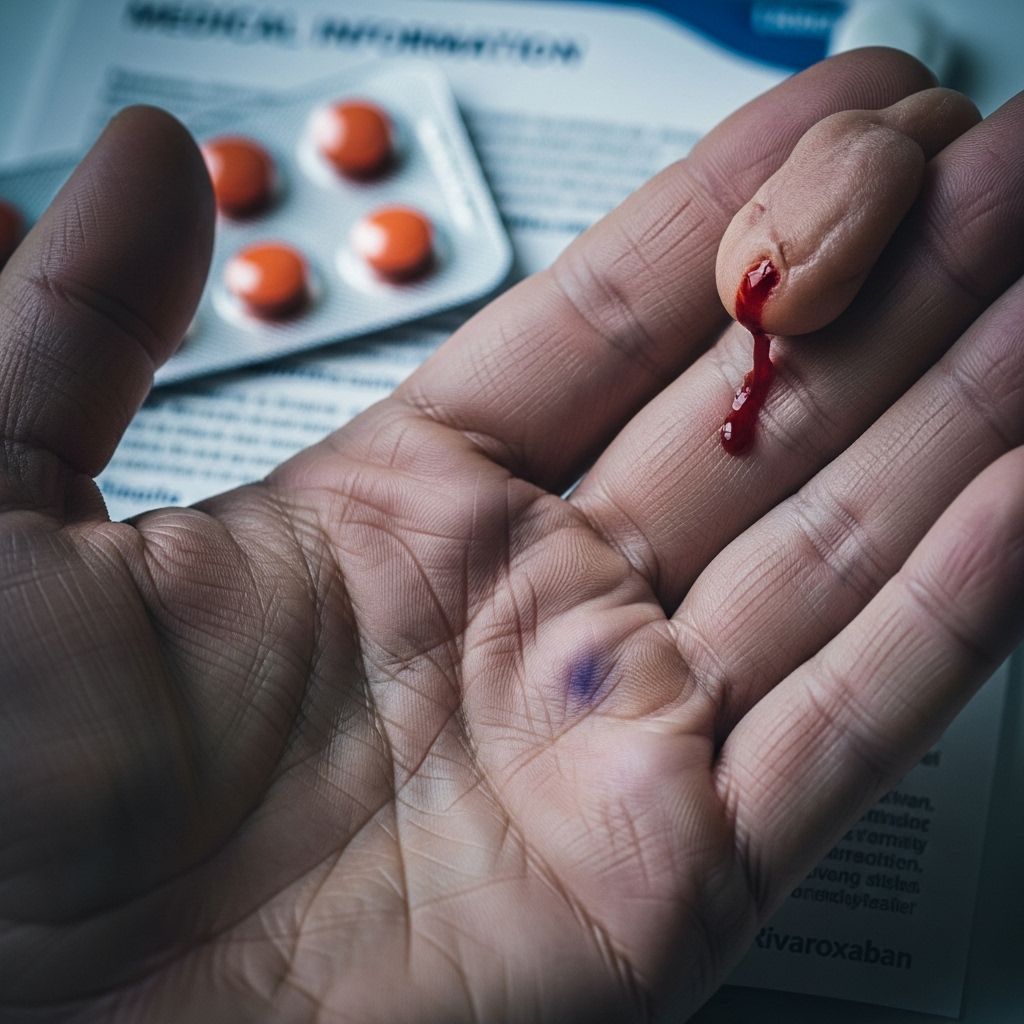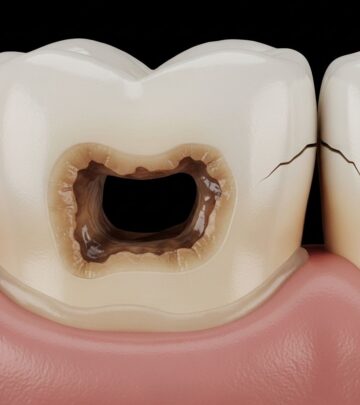Side Effects of Rivaroxaban: What to Expect and When to Seek Help
Comprehensive guide to common, serious, and rare side effects of rivaroxaban, including expert advice on what to do in emergencies.

Side Effects of Rivaroxaban
Rivaroxaban is an anticoagulant commonly prescribed to prevent and treat blood clots. Like all medicines, rivaroxaban can cause side effects. While most people experience mild or no symptoms, some may encounter serious complications that require urgent medical attention. Understanding these side effects is crucial for safe and effective use.
Common Side Effects
Most side effects of rivaroxaban are related to its blood-thinning effects. The following are commonly reported and not usually dangerous, though they should be monitored:
- Easy bruising: Bruises may appear more easily and take longer to fade.
- Minor bleeding: This includes nosebleeds (lasting less than 10 minutes), bleeding from gums when brushing teeth, or bleeding for longer than usual after a cut.
- Heavy or prolonged menstrual periods: Periods may become heavier and last longer than usual.
- Feeling sick (nausea) or vomiting
- Headache or dizziness
- Stomach discomfort: Indigestion or stomach ache
Most of these side effects are mild and often improve as your body adjusts to the medication. If bleeding becomes bothersome or persistent, speak with your doctor.
What You Can Do for Minor Bleeding
- Cuts: Apply firm pressure to the wound with a clean cloth for at least 10 minutes.
- Nosebleeds: Sit or stand upright (do not lie down) and gently pinch your nose just above the nostrils until the bleeding stops.
- Gum bleeding: Use a soft bristle toothbrush and avoid hard brushing.
- Avoid non-prescribed medications that can worsen bleeding (like aspirin or NSAIDs), unless recommended by your doctor.
More Serious Side Effects — When to Seek Medical Help
Serious side effects are less common but can be life-threatening. Seek immediate medical attention if you experience any of the following:
- Red or dark brown urine
- Black, red, or tarry stools
- Vomiting blood or material that looks like coffee grounds
- Coughing up blood
- Excess bleeding from wounds or injuries
- Heavy and persistent nosebleeds or gum bleeding
- Sudden severe headache
- Sudden loss of vision
- Numbness or weakness in the limbs
- Swelling in lips, mouth, eyes, or throat (possible allergic reaction)
- Shortness of breath or chest pain
- Unusual paleness, tiredness, or dizziness
If you notice any of the above symptoms, call 999 or go to the nearest A&E immediately. These symptoms could indicate severe bleeding, internal bleeding, or a serious allergic reaction.
Rare and Less Common Side Effects
- Fainting
- Pain in the arms or legs
- Wound secretion
- Burning feeling while urinating or difficulty/painful urination
- Blistering, peeling, or loosening of the skin
- Blurred vision
- Chest tightness
- Chills or fever
- Joint or muscle pain
- Loss of appetite
- Red skin lesions or rash, often with a purple center
- Sores, ulcers, or white spots in the mouth or on the lips
- Yellowing of the skin or eyes (jaundice)
Comparing Rivaroxaban to Other Anticoagulants
| Side Effect | Rivaroxaban | Warfarin |
|---|---|---|
| Intracranial Bleeding | Lower risk | Higher risk |
| Gastrointestinal Bleeding | Higher risk | Lower risk |
| Nosebleeds, Blood in Urine | More common | Less common |
| Dietary interactions | None known | Common (vitamin K rich foods) |
In clinical trials, rivaroxaban caused less intracranial bleeding than warfarin, but more gastrointestinal symptoms and bleeding (indigestion, stomach ache, nosebleeds, blood in urine)3. Unlike warfarin, rivaroxaban has no significant dietary restrictions, but patients must remain alert to signs of bleeding.
Managing Risks and Safety Precautions
- Always carry your rivaroxaban alert card—provided with your medication—and present it to any health care provider, including pharmacists and dentists.
- Notify all health professionals (GP, nurse, pharmacist, dentist) that you are taking rivaroxaban before starting new medicines, supplements or herbal remedies.
- Inform your GP immediately if you experience vomiting or diarrhea, as you may not absorb rivaroxaban properly. Temporary switch to injectable anticoagulant may be necessary.
- Avoid activities that may increase the risk of falls, bumps to the head, or injuries.
- Be cautious with over-the-counter medicines, especially blood-thinners and anti-inflammatory drugs.
What to Do If You Miss a Dose
- Take the missed dose as soon as you remember on the same day.
- Do not take more than one dose per day—never double up to make up for a missed dose.
- If you miss a dose and it’s close to your next scheduled dose, skip the missed dose and continue with the next dose as normal.
- If you are unsure whether you have taken your medicine, do not take an extra dose. Resume the next dose at the usual time.
What to Do If You Take Too Many Tablets
- If you accidentally take more than one dose in 24 hours, contact your doctor, NHS 111, or local hospital casualty department immediately.
- Bring your medication pack with you when seeking medical assistance.
- Overdoing it increases the risk of serious bleeding.
Alerts & Reversal
- There is currently no licensed reversal agent for rivaroxaban. In cases of urgent or excessive bleeding, the medication will be stopped and supportive measures started.
- Notify emergency services if you experience symptoms after a fall or injury, especially involving the head.
Special Considerations and Notifications
- If you develop a severe allergic reaction (swelling of face/lips/throat, severe rash, difficulty breathing) stop rivaroxaban immediately and call 999.
- If hospitalized, ensure all your healthcare providers are aware of your medication changes.
- Visit the nearest emergency department for unexplained pain or swelling in one or both legs, or shortness of breath, chest pain, or coughing up blood.
Frequently Asked Questions (FAQs)
Q: Does rivaroxaban cause more bleeding than other blood thinners?
A: Rivaroxaban may cause more nosebleeds, gastrointestinal bleeding, and blood in urine compared to warfarin, but carries a lower risk of dangerous bleeding into the brain3.
Q: What should I do if I notice unusual bleeding?
A: For minor bleeding, apply pressure or follow standard first aid. Contact a doctor if the bleeding persists or is concerning. For serious bleeding (blood in urine, stools, or vomit, severe headache, loss of vision), seek emergency help immediately.
Q: Can I reverse rivaroxaban in case of excessive bleeding?
A: Currently there is no specific antidote. Doctors will stop the medicine and provide supportive care.
Q: Is it safe to take supplements or herbal remedies with rivaroxaban?
A: Always check with your doctor or pharmacist before starting any new supplement or remedy. Bring your alert card when seeking advice.
Q: What happens if I miss a dose?
A: Take it as soon as you remember on the same day. Never double up doses.
Q: Who should I inform about my rivaroxaban prescription?
A: Tell your GP, pharmacist, dentist, and any other healthcare professional involved in your care, especially before any medical or dental procedures.
Q: Should I stop taking rivaroxaban if I experience side effects?
A: Never stop taking your medication suddenly. Contact your doctor to discuss your symptoms or for advice. In case of allergic reactions or serious side effects, discontinue and seek emergency care.
Practical Tips for Staying Safe on Rivaroxaban
- Attend all scheduled medical appointments for monitoring.
- Carry your rivaroxaban alert card at all times.
- Keep a list of your medicines and show it during medical visits.
- Report all unusual bleeding or bruising, and any new symptoms, to your doctor promptly.
- Store your medication securely and follow dosing instructions closely.
- Find support and further information from NHS resources or your prescribing clinic.
Summary Table: Key Side Effects and Next Steps
| Symptom | Is it dangerous? | What should you do? |
|---|---|---|
| Minor bruising, nosebleeds <10 min, gum bleeding | No | Monitor, use first aid, inform doctor if persistent |
| Heavy/prolonged periods | No | Inform doctor if bothersome |
| Red/black/pink urine or stools, vomiting blood | Yes | Seek emergency help |
| Sudden severe headache, vision loss, numbness | Yes | Call 999 / A&E |
| Swelling of lips/face/throat, severe breathlessness | Yes (possible allergy) | Stop medication, call 999 |
| Feeling sick, mild stomach pain, headache | No | Monitor, inform doctor if persistent |
Conclusion
Rivaroxaban is an effective blood thinner but, like all medicines, carries a risk of side effects, primarily related to bleeding. Most side effects are mild and manageable, but everyone taking rivaroxaban should be vigilant for serious symptoms and know when to seek medical help. Clear communication with your healthcare team and following safety advice will help minimize risks and ensure the best possible health outcomes.
Read full bio of Sneha Tete












